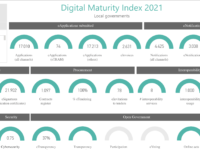Till 2017, the Ministries and govt. organizations took individual, decentralized & disintegrated initiatives to digitize public services. But most initiatives were facing challenges to provide services due to unplanned design and implementation. To overcome this, Digital Service Design Lab is an innovative method where service providers, service recipients and IT experts design digital services and prepare digitization masterplan together for their respective ministry/org. within just 6-7 days.
Innovation Tag: Open Government
The innovation is a new and comprehensive awareness program to apprise the public of the existing policy and legal framework in which they operate in Lebanon, through the mapping of existing laws and decrees, by topics and sectors. The aim is to understand the existing framework as a first step in working toward a just one. This empowers public officials and citizens with the right information to establish rule of law and accountability and to flag out gaps, inconsistencies and required reforms.
MiLAB - Govtech and Public Impact Laboratory, aims to contribute on the digital transformation acceleration of the public sector, by connecting it, through collaboration and open innovation strategies, with start-ups and SMEs that uses emergent technologies and innovative methodologies. MiLAB successfully specialized its activity within the public impact ecosystem, attending the high demand and global tendency of rely on digital innovator among the Government.
Officina is a lab for innovation in the public sector whose main objective is to catalyse the energy of young talents by offering them a transformative training programme. Officina was developed to address a triple urgency: future decision makers not perceiving the public sector as an attractive workplace; the public sector having high average age workforce and lack of innovative approaches; society at large needing a more modern and appealing public sector in this key historical moment.
The Transparency+ Portal is a digital platform of the Portuguese state, where citizens can access easy-to-read and updated information on public spending in an accessible way, combining data science and storytelling. Launched in 2021, the platform is now a reference resource for monitoring European funds, State and local budgets, and public contracts. In a world often perceived through lens of mis/disinformation, Transparency+ is building trust by nurturing civic engagement and open government.
MedeINN arose from the need to innovate in the government sector, in a city that had been developing its innovation capabilities in all other sectors. For this reason, and under Innovative State premise, we seek to connect the Mayor's Office of Medellín´s challenges with entrepreneurs and researchers capacities. This has been achieved after a redesign of a Public Procurement for Innovation methodology, which enables Open Innovation in the government sector.
UK Government is investing in innovative public policy design expertise. Public policy design has been gathering momentum over the past 10 years. But 2022 was a landmark year for public policy design. For the first time, the UK’s government is sponsoring major networks that champion design as key for making policy and services that drive outstanding public value.
With the Quality Tools an organisation can evaluate, monitor and compare the quality and use of its services within and between organisations. The tools include a Self-assessment, Customer Feedback and Utilisation Rate Measurement tool and are free of charge. The tools were developed primarily for public sector organisations to help them develop customer-oriented digital services and improve knowledge-based management. On a national level the tools provide data on the state of digitalisation.
Case Study
Personalized feedback service for national qualification test result – Digital Mentor Service…

"Why did I fail? How should I develop my career?" To address such concerns, we developed the Digital Mentor Service of National Qualification. It leverages massive data on national qualification tests to identify each individual's weaknesses and why they fail. It also provides personalized information by matching examination history with jobs and training offered by government agencies. Supporting test takers from skills assessment and development to job placement.
Digital transformation is a long-term journey that involves complex changes. One of the challenges is how we evaluate the progress. We are inspired by the quote, "If you cannot measure it, you cannot improve it". Most of Catalonia's municipalities cannot do a digital assessment. The Digital Maturity Index provides an evaluation turnkey solution for local governments. It is based on open data, and it has a clear focus on public value impact.




